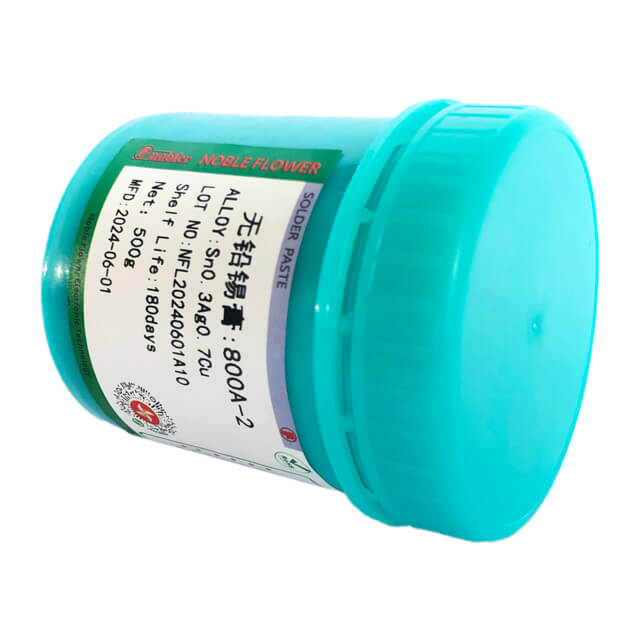Views: 1 创始人: Site Editor Publish Time: 2024-11-20 Origin: Site








In
the field of electronic soldering, silver-containing solder wire has attracted
attention due to its unique properties. It uses silver as the main added
ingredient and has a series of significant advantages and disadvantages
compared to traditional solder wire.
Merit:
Good conductivity: Silver is an excellent conductor of
electricity, and the presence of silver in silver-containing solder wire makes
it have good conductivity. This helps to ensure the smooth flow of current,
reduce resistance, and improve the reliability and stability of the circuit
when welding electronic components. Especially in high-frequency circuits, the
conductivity of silver-containing solder wire is more obvious, which can reduce
the loss of signal transmission and improve the performance of the circuit.
High strength and availability: The addition of silver makes the
solder wire have higher strength, and the joint after soldering is stronger.
When subjected to external forces such as vibration and shock, it is not easy
to crack or desolder, which can ensure the long-term stable operation of
electronic equipment in complex environments. This is of great significance for
some electronic equipment with high reliability requirements, such as
aerospace, military and other fields.
Strong oxidation resistance: silver has good oxidation resistance,
and silver-containing solder wire is not easy to be oxidized in the air, which
can keep the soldering joint in good condition. In contrast, ordinary solder
wire is prone to oxidation in the air, resulting in a decrease in soldering
quality and affecting the performance and life of the circuit. The oxidation
resistance of silver-containing solder wire can extend the life of the solder
joint and reduce the frequency of maintenance and replacement.
Good soldering performance: Silver-containing solder wire has good wettability and fluidity during the soldering process, which can quickly and evenly cover the soldering surface and form a full solder joint. This helps to improve welding efficiency, reduce welding time and energy consumption, and also improve welding quality and reduce the occurrence of defects such as virtual welding and false welding.

Shortcoming:
High cost: Silver is a precious metal and its price is
relatively high. Although the silver content in silver-containing solder wire
is usually within a certain percentage range, due to the cost factor of silver,
the price of silver-containing solder wire is much higher than that of ordinary
solder wire. This may limit its widespread application in some cost-sensitive
areas of electronics manufacturing.
High soldering temperature requirements: The melting point of silver-containing
solder wire is relatively high, and it needs to be soldered at a higher
temperature. This requires welding equipment with high temperature control
capabilities to ensure the stability and reliability of the welding process. At
the same time, higher soldering temperatures may also cause thermal damage to
some sensitive electronic components, and special attention needs to be paid to
temperature control during the soldering process.
High hardness: The hardness of silver-containing
solder wire is relatively large due to the addition of silver. When soldering
some small electronic components, it may be difficult to operate because the
solder wire is too hard, and it is easy to cause damage to the component pins.
In this case, a finer solder wire or other auxiliary tools are required for
soldering.
In
summary, silver-containing solder wire has obvious advantages in conductivity,
strength, oxidation resistance and welding performance, but also has
disadvantages such as high cost, high welding temperature requirements and high
hardness. In practical application, it is necessary to select the appropriate
welding material according to the specific needs and circumstances,
comprehensively consider the advantages and disadvantages of silver-containing
solder wire. For occasions with high requirements for conductivity and
reliability, silver-containing solder wire is a better choice; For
cost-sensitive areas, common solder wire or other alternative materials may be
considered. Silver-containing solder wire has a non-negligible position in the
field of electronic welding. Its advantages such as good electrical
conductivity, high strength, strong oxidation resistance and good welding
performance make it play an important role in fields such as aerospace and
military that require extremely high reliability. In these areas, circuit
stability, signal transmission accuracy, and solder joint firmness are
critical, and silver-containing solder wire is well suited to meet these needs.
However,
its disadvantages also limit its application range to a certain extent. The
high cost factor makes some electronic manufacturing companies with strict cost
control have some concerns when choosing soldering materials. For example, some
companies that mass-produce consumer electronic products, in order to control
costs, may give priority to ordinary solder wire. The high soldering
temperature requirements not only put forward higher requirements for soldering
equipment, but also increase the risk of thermal damage to sensitive electronic
components during the soldering process, which requires more precise operating
procedures and temperature control methods. However, the problem of high
hardness can be inconvenient when soldering small electronic components, and
may require additional investment to solve the problem, such as the use of
finer solder wires or auxiliary tools.
Therefore,
when choosing a silver-containing solder wire or other soldering materials, it
is necessary to fully weigh various factors. If the product has extremely high
requirements for electrical conductivity, oxidation resistance and solder joint
strength, and can afford high costs, then silver-containing solder wire is the
best choice. However, in cases where cost control is critical, or where
simplicity of soldering operations is more important, plain solder wire or
other alternative materials may be more suitable.
 苏公网安备32058302004438
苏公网安备32058302004438